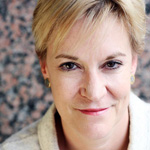A lot of people assume that the CFO at any company is simply the in-house budget wonk. Their role, of course, is to make sure their company is using fiscal sense and building a strong, sustainable financial portfolio. For Jackie Fouse, CFO and executive vice president of New Jersey-based Celgene Corporation, one of the largest biopharmaceutical companies in the world, that approach doesn’t quite cut it. To her, a company’s financial strength is only as strong as its business model. Talent and strategic planning are what will make a company successful; good bottom-line performance will happen as a consequence.
“I spend a lot of time with my team, and with my peers in my management committee, to work together on what our critical business issues are,” Fouse says. “I don’t think about myself as sitting in the corner managing from behind my desk. I think of myself as being somebody who should be out there understanding everything that’s going on in discovery, clinical research, regulatory, commercial, technical operations, and more—helping us figure out the best way to mobilize our financial resources to achieve our strategic objectives. I’m trying to be a problem solver as opposed to a CFO who always says no.”
—Jackie Fouse
Celgene focuses on the development of innovative therapies that address unmet needs in patients with cancer and immune-inflammatory diseases. When Fouse first arrived at the company in 2010, it was coming off a period of almost overnight growth. In 2005, it had begun US commercialization of one of its discoveries called REVLIMID, a drug approved for the treatment of patients with relapsed or refractory multiple myeloma, a terminal blood cancer. The success was overwhelming: patients improved their quality of life and often extended their life expectancies by five years or more. As a result of the recognized therapeutic value of this therapy, Celgene was propelled from a relatively small company to a multibillion-dollar global corporation that is helping patients worldwide live longer, better, and healthier lives.
Fouse came to Celgene from Bunge Limited, a large agricultural commodities company. At an agricultural company with a very quick turnaround on its products—“Food is perishable,” Fouse says—and low profit margins, Fouse was working with a very different business model than the one you’d find at a biopharmaceutical company, which involves decades of research and development, but significantly higher profit margins. “They’re almost at opposite ends of the spectrum in terms of business model,” she says, “but with experience in both, I can be a better manager.” The health-care spectrum wasn’t completely foreign to Fouse however; prior to Bunge, she had worked at Alcon, the world’s largest eye-care company.
A lot of Fouse’s initial work at Celgene involved her evaluation of the functioning of the financial planning and analysis department to make sure it fit the new, larger company Celgene was becoming. She wanted to shift her team’s focus toward developing analytical capabilities that would allow the company to make better business decisions. First, she had to find out from employees and managers what needs weren’t being met and where the inefficiencies were.
Getting to Know
Jackie Fouse
What’s the best advice you’ve ever been given?
Early on, somebody said to me, as someone who was pursuing the path of being a finance professional, that I would be more successful if I stayed focused on understanding the business first, and mastering my financial skills second.
What motivates you most in life?
For one, whatever I do, I like to feel like I’m in an environment where I’m pushing myself to realize my full potential. Also, it’s extremely gratifying to know that you’re part of a team of people that’s working to benefit somebody who is suffering from a serious disease.
Which part of your job could you live without?
Anything too administrative.
What’s your greatest passion outside the office?
Long-distance running.
Where do you see yourself in five years?
Running on a mountain trail somewhere—either that or here at Celgene, driving us ahead, not only making us bigger, but, more importantly, better.
If you had to do something other than be a CFO at a biotech company, what would it be?
I’d probably have a tapas and wine bar.
“It was more suited to my interests and background, because I’m not an accountant,” she says. “I spent a lot of time within the business just asking what our needs were. I then looked at how we were organized across all the financial departments, and whether we were really set up to most effectively deliver quality, value-added services to the organization. What I found was an evolving function that needed optimizing from an organizational standpoint for people to have clear focus and accountabilities.”
Her initial research led to a significant restructuring of the FP&A department, internal personnel movement, and the select hiring of some outside talent to help maximize opportunities and to continue supporting Celgene’s strong growth trajectory.
Nearly three years later, doing in-house evaluations like this is still a huge part of what Fouse does on a day-to-day basis. She aims to keep a constant dialogue going within the company, so that everyone is on the same page in terms of goals and objectives. Listening to her colleagues is as important to understanding the health of the company as looking at revenue numbers.
“One of the big ways that I assess how we’re doing on an ongoing basis is by talking with people, [asking], ‘How’s the business doing today, where are we today?,’” Fouse says. “We may have different roles to play to achieve our overall company objectives, but we should all know what’s going on with the business all the time. We need to know what is working well and where we can still do better.”
Fouse has also established some ambitious goals for Celgene over the next five years. The company plans to double its revenue to $12 billion by 2017, a goal it is able to strive for by virtue of Celgene’s unique scientific approach, productivity of research and development, life-enhancing therapies, and a track record of successful commercial execution worldwide. Abraxane, a novel cancer chemotherapy, and Apremilast, an oral treatment for psoriatic arthritis and psoriasis, have both shown positive results in their late-stage clinical trials. To Fouse, a strong company financial profile is an accurate reflection of such transformational and innovative work regularly being delivered.
To that end, Fouse doesn’t like to draw too thick a line between what the goals of her department are and what Celgene is trying to do as a health-care company. Helping patients live longer, better, and healthier lives, she says, is ultimately the mission of the whole company. When FP&A is able to help different parts of the corporation better manage their money and make the best business decisions, it means that more of the company’s resources can go directly to the research and development that will produce next generation of medical innovations for patients in need.
“We talk a lot about the fact that every dollar we don’t spend on the back office and every dollar we use to make better investment decisions is a dollar that will go back to directly impact the science, the product development,” Fouse says. “That’s a dollar that will help a patient. And helping employees understand that each and every one of them can help a patient by being the best they can be at their jobs is extremely motivating for our people.”

